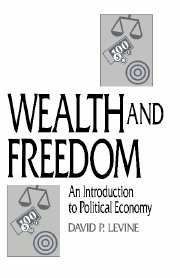5 - Creative destruction
Published online by Cambridge University Press: 20 March 2010
Summary
Innovation
Change under capitalism is not accidental. Change, from poor to wealthy society, is the purpose of capitalist economic organization. This means change in what and how much we produce and consume, change in our methods of production, and change in the way we organize the production process. If all market economy did was assure satisfaction of unchanging wants by unchanging means, it would not be the answer to Adam Smith's question: How do we create a wealthy society? The problem is not, then, satisfaction of habit-dominated wants but adjustment to change. The change that a capitalist market economy must adjust to is change brought about to enhance the profitability of capitalist enterprise. The profit motive lies at the heart of the process of growth and development of a capitalist economy.
In a capitalist economy, the agent that brings about change is the capitalist enterprise and especially the capitalist entrepreneur.
An entrepreneur is an individual or group that introduces a change in what is produced, how it is produced, or how it is sold.
Because the entrepreneur is driven by a desire for profit, the change brought about must hold the promise of yielding a profit otherwise unavailable.
The profit motive is central to the behavior of the entrepreneur; but it does not wholly explain why he does what he does. In a broader view, the entrepreneur is motivated to reorganize and redirect society's energies along new paths.
- Type
- Chapter
- Information
- Wealth and FreedomAn Introduction to Political Economy, pp. 58 - 64Publisher: Cambridge University PressPrint publication year: 1995



